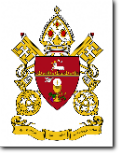Beliefs of the Provinces
OCCNA Statement of Beliefs
We believe that Sacred Tradition is the life of the Church and as such is the means for interpretation and discernment. Sacred Tradition is expressed in the:
- Sacred Scripture.
- Liturgy
- Creed
- Lives of the Saints (living and dead).
- Art especially icons.
We believe in the inerrancy and divine inspiration of Holy Scriptures and that final interpretation rests with the Catholic "Universal" Church and not the individual. For example:
We accept as true that homosexual practice is not a compatible lifestyle with either Scripture or Sacred Tradition and as such we will not participate in the legitimizing or blessing of same sex unions nor will we ordain those who are involved in same gender unions. However, we also recognize that there are among us persons who experience themselves as having a homosexual orientation. Many of these are members of the Church and are seeking the pastoral care, moral direction of the Church, and God's transforming power for the living of their lives and the ordering of relationships
We believe that abortion and euthanasia is the taking of human life.
We believe the Apostles Creed to be the Baptismal symbol and the Nicene Creed is the Statement of the Faith of the Early Church and we believe ALL that it professes. For example, the Creed defines:
- The nature and relationship of Holy Trinity. Which is that God is one in three divine persons:
- The Father, who created it all; the Son, who died for our sins and rose from the dead; the Holy Spirit, who regenerates and sanctifies souls.
- Jesus Christ became man and died on the cross for our salvation.
- The Incarnation and virgin birth of our Lord.
- Apostolic Succession.
- Communion of Saints.
- One Baptism.
- Resurrection and life in the world to come
We believe in the seven sacraments of the Church. Baptism, Confirmation, Holy Eucharist, Anointing of the Sick (Extreme Unction), Reconciliation (Confession & Absolution), Holy Matrimony, and Holy Orders.
Concerning Holy Eucharist, we believe in the Real Presence of Jesus Christ in the Eucharist as set forth by the Declaration of Utrecht. And that Holy Communion should be made available to all baptized Christians regardless of tradition or denomination.
We believe that as Baptism provides regeneration and marks one as Christ’s on forever then too all baptized Christians should be allowed to receive the Sacraments of Holy Communion, Anointing, Matrimony, and Reconciliation.
Concerning the Sacrament of Holy Matrimony
We believe that both Scripture and the Sacred Tradition of the Church, upholds faithfulness in marriage between a man and a woman in lifelong union, and believes that abstinence is right for those who are not called to marriage. However, we also believe that Jesus is merciful and those who have been divorced and/or remarried are offered the sacraments of the church.
We believe and accept the doctrines of the Seven Early Church Ecumenical Councils without exception to the Anathema statements and accept those canons which are accepted by the majority of the Catholic Church. For example:
- We believe and appreciate the wisdom and guidance of the Early Church Fathers.
- We believe in and hold apostolic succession.
- We appreciate the wisdom and guidance of the founding Fathers of the Old Catholic Movement as expressed in historic documents of the Old Catholic Churches of Europe.
- The matter and form of Sacraments will be identical in intent and form to those used by other historic
- Catholic churches, specifically the Roman Catholic Church, the Episcopal, Anglican, Old Catholic and Eastern Orthodox Churches.
As such we believe that the Declaration of Utrecht is the cornerstone document of the Old Catholic Faith. That The Fourteen Theses of the Old Catholic Conference at Bonn is a historical document used to further explain the intent of the Declaration of Utrecht. And The Road to Unity which is a collection of agreed statements of the joint Old Catholic - Orthodox Theological Commission further explains the theology and beliefs of the Old Catholic Faith.

